Comprehensive Analysis of the UK Legal System and its Employment Laws
VerifiedAdded on 2023/06/13
|9
|2676
|150
Report
AI Summary
This report provides a comprehensive overview of the UK legal system, beginning with a classification of laws and an explanation of the legal system's structure. It details the roles of the High Court and Supreme Court, highlighting their importance in the judicial hierarchy. The report explores the sources of law, including case law and the legislative process, and discusses delegated legislation. Furthermore, it delves into UK employment law, outlining the statutory duties of employers to their employees, and addressing wrongful and unfair dismissal actions. The document is available on Desklib, a platform offering a wide range of study resources for students.
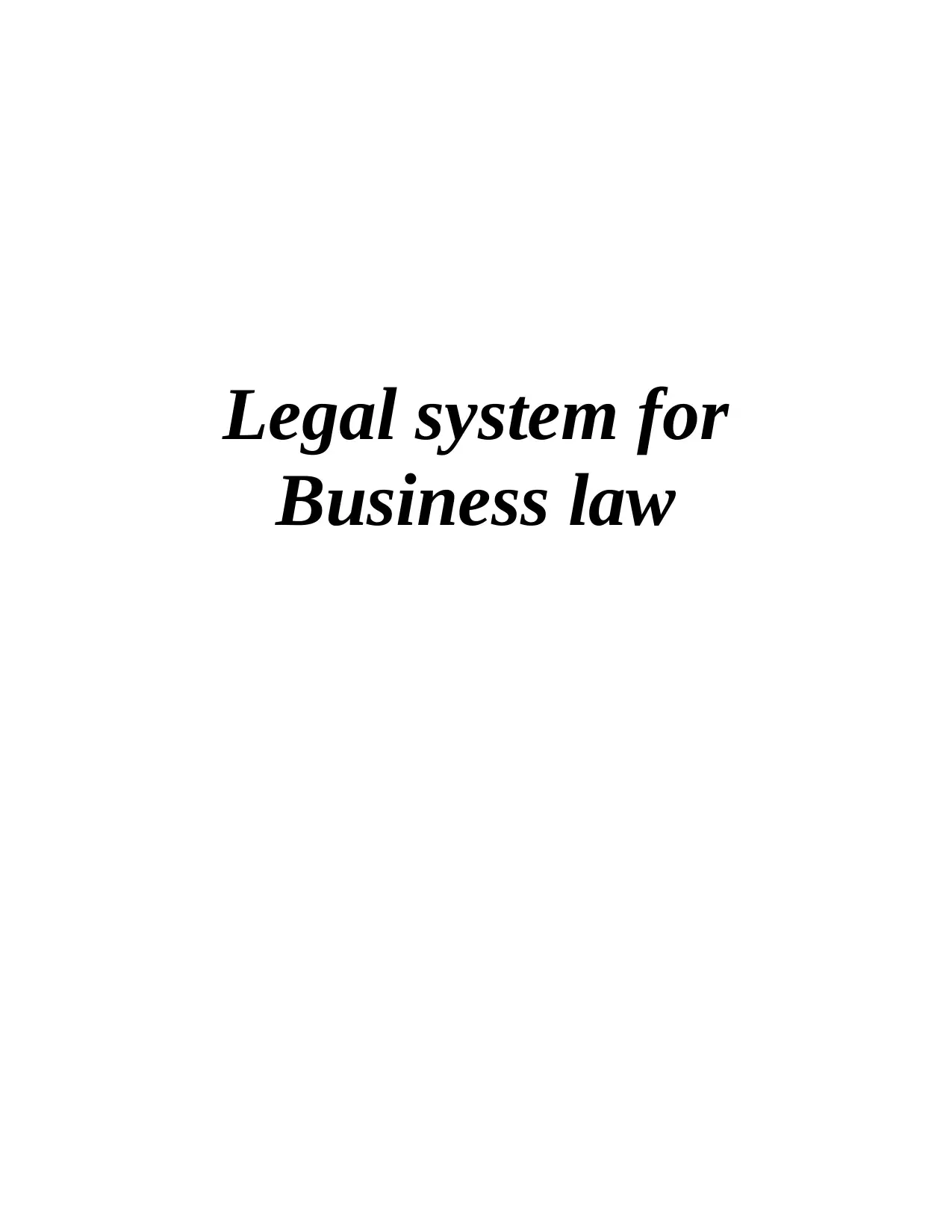
Legal system for
Business law
Business law
Paraphrase This Document
Need a fresh take? Get an instant paraphrase of this document with our AI Paraphraser
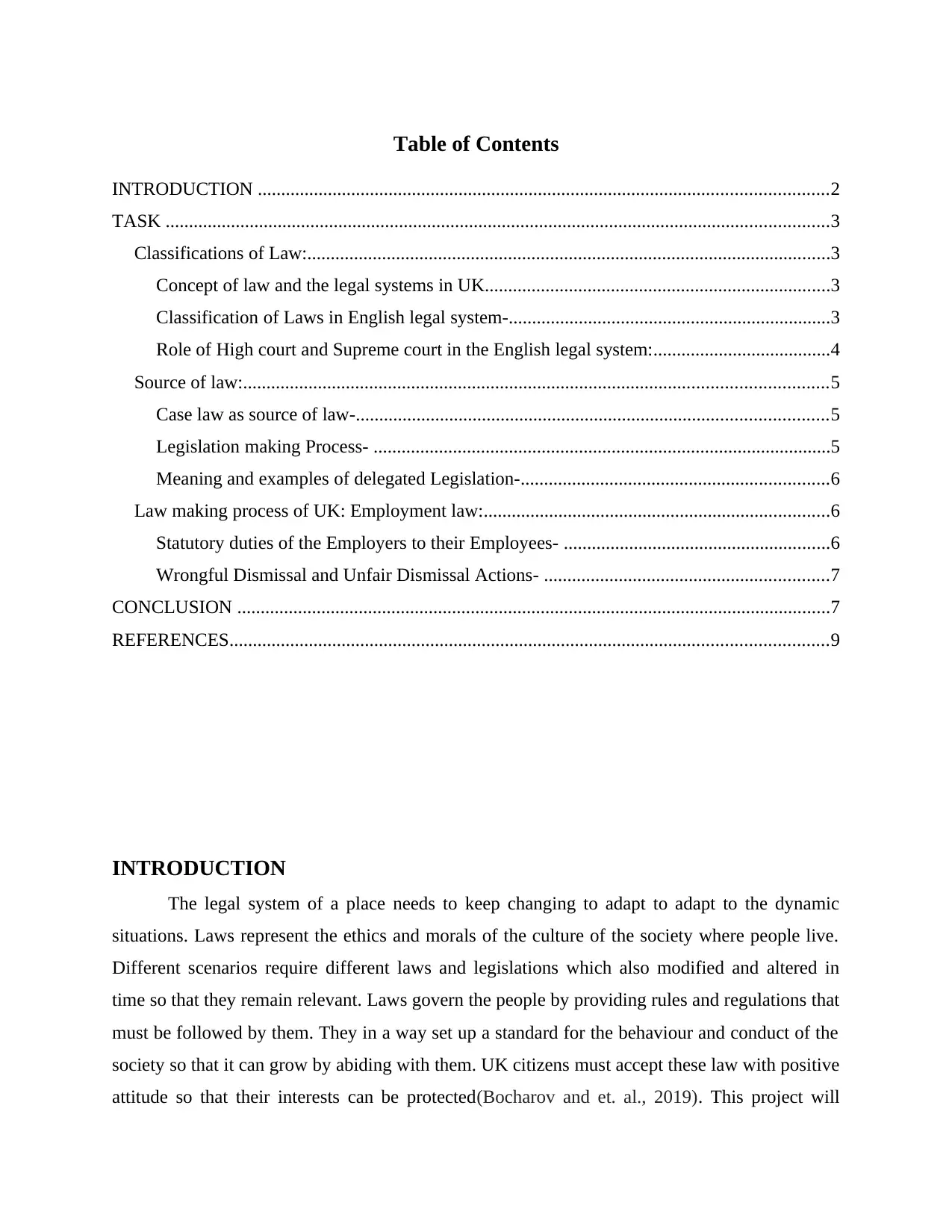
Table of Contents
INTRODUCTION ..........................................................................................................................2
TASK ..............................................................................................................................................3
Classifications of Law:................................................................................................................3
Concept of law and the legal systems in UK..........................................................................3
Classification of Laws in English legal system-.....................................................................3
Role of High court and Supreme court in the English legal system:......................................4
Source of law:.............................................................................................................................5
Case law as source of law-.....................................................................................................5
Legislation making Process- ..................................................................................................5
Meaning and examples of delegated Legislation-..................................................................6
Law making process of UK: Employment law:..........................................................................6
Statutory duties of the Employers to their Employees- .........................................................6
Wrongful Dismissal and Unfair Dismissal Actions- .............................................................7
CONCLUSION ...............................................................................................................................7
REFERENCES................................................................................................................................9
INTRODUCTION
The legal system of a place needs to keep changing to adapt to adapt to the dynamic
situations. Laws represent the ethics and morals of the culture of the society where people live.
Different scenarios require different laws and legislations which also modified and altered in
time so that they remain relevant. Laws govern the people by providing rules and regulations that
must be followed by them. They in a way set up a standard for the behaviour and conduct of the
society so that it can grow by abiding with them. UK citizens must accept these law with positive
attitude so that their interests can be protected(Bocharov and et. al., 2019). This project will
INTRODUCTION ..........................................................................................................................2
TASK ..............................................................................................................................................3
Classifications of Law:................................................................................................................3
Concept of law and the legal systems in UK..........................................................................3
Classification of Laws in English legal system-.....................................................................3
Role of High court and Supreme court in the English legal system:......................................4
Source of law:.............................................................................................................................5
Case law as source of law-.....................................................................................................5
Legislation making Process- ..................................................................................................5
Meaning and examples of delegated Legislation-..................................................................6
Law making process of UK: Employment law:..........................................................................6
Statutory duties of the Employers to their Employees- .........................................................6
Wrongful Dismissal and Unfair Dismissal Actions- .............................................................7
CONCLUSION ...............................................................................................................................7
REFERENCES................................................................................................................................9
INTRODUCTION
The legal system of a place needs to keep changing to adapt to adapt to the dynamic
situations. Laws represent the ethics and morals of the culture of the society where people live.
Different scenarios require different laws and legislations which also modified and altered in
time so that they remain relevant. Laws govern the people by providing rules and regulations that
must be followed by them. They in a way set up a standard for the behaviour and conduct of the
society so that it can grow by abiding with them. UK citizens must accept these law with positive
attitude so that their interests can be protected(Bocharov and et. al., 2019). This project will
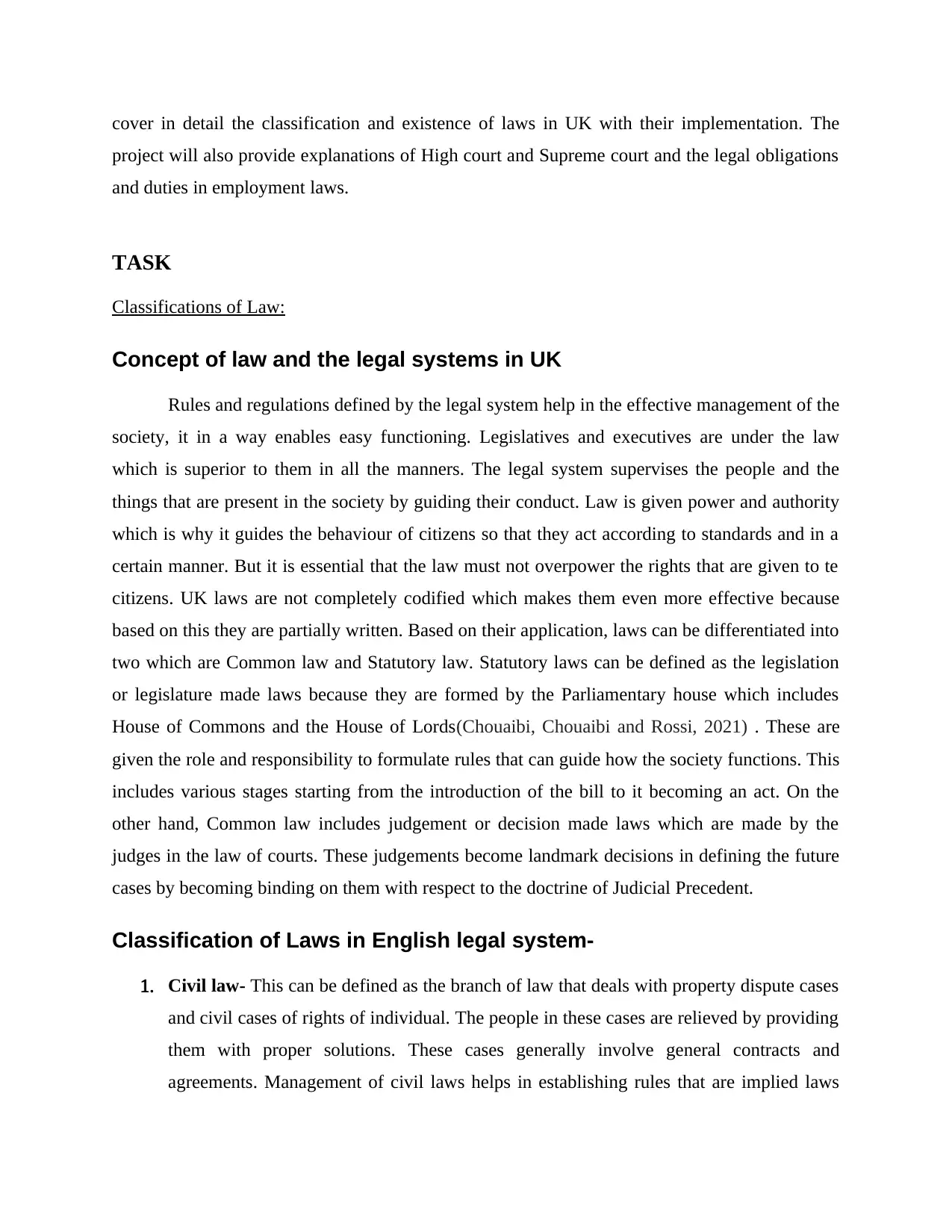
cover in detail the classification and existence of laws in UK with their implementation. The
project will also provide explanations of High court and Supreme court and the legal obligations
and duties in employment laws.
TASK
Classifications of Law:
Concept of law and the legal systems in UK
Rules and regulations defined by the legal system help in the effective management of the
society, it in a way enables easy functioning. Legislatives and executives are under the law
which is superior to them in all the manners. The legal system supervises the people and the
things that are present in the society by guiding their conduct. Law is given power and authority
which is why it guides the behaviour of citizens so that they act according to standards and in a
certain manner. But it is essential that the law must not overpower the rights that are given to te
citizens. UK laws are not completely codified which makes them even more effective because
based on this they are partially written. Based on their application, laws can be differentiated into
two which are Common law and Statutory law. Statutory laws can be defined as the legislation
or legislature made laws because they are formed by the Parliamentary house which includes
House of Commons and the House of Lords(Chouaibi, Chouaibi and Rossi, 2021) . These are
given the role and responsibility to formulate rules that can guide how the society functions. This
includes various stages starting from the introduction of the bill to it becoming an act. On the
other hand, Common law includes judgement or decision made laws which are made by the
judges in the law of courts. These judgements become landmark decisions in defining the future
cases by becoming binding on them with respect to the doctrine of Judicial Precedent.
Classification of Laws in English legal system-
1. Civil law- This can be defined as the branch of law that deals with property dispute cases
and civil cases of rights of individual. The people in these cases are relieved by providing
them with proper solutions. These cases generally involve general contracts and
agreements. Management of civil laws helps in establishing rules that are implied laws
project will also provide explanations of High court and Supreme court and the legal obligations
and duties in employment laws.
TASK
Classifications of Law:
Concept of law and the legal systems in UK
Rules and regulations defined by the legal system help in the effective management of the
society, it in a way enables easy functioning. Legislatives and executives are under the law
which is superior to them in all the manners. The legal system supervises the people and the
things that are present in the society by guiding their conduct. Law is given power and authority
which is why it guides the behaviour of citizens so that they act according to standards and in a
certain manner. But it is essential that the law must not overpower the rights that are given to te
citizens. UK laws are not completely codified which makes them even more effective because
based on this they are partially written. Based on their application, laws can be differentiated into
two which are Common law and Statutory law. Statutory laws can be defined as the legislation
or legislature made laws because they are formed by the Parliamentary house which includes
House of Commons and the House of Lords(Chouaibi, Chouaibi and Rossi, 2021) . These are
given the role and responsibility to formulate rules that can guide how the society functions. This
includes various stages starting from the introduction of the bill to it becoming an act. On the
other hand, Common law includes judgement or decision made laws which are made by the
judges in the law of courts. These judgements become landmark decisions in defining the future
cases by becoming binding on them with respect to the doctrine of Judicial Precedent.
Classification of Laws in English legal system-
1. Civil law- This can be defined as the branch of law that deals with property dispute cases
and civil cases of rights of individual. The people in these cases are relieved by providing
them with proper solutions. These cases generally involve general contracts and
agreements. Management of civil laws helps in establishing rules that are implied laws
⊘ This is a preview!⊘
Do you want full access?
Subscribe today to unlock all pages.

Trusted by 1+ million students worldwide
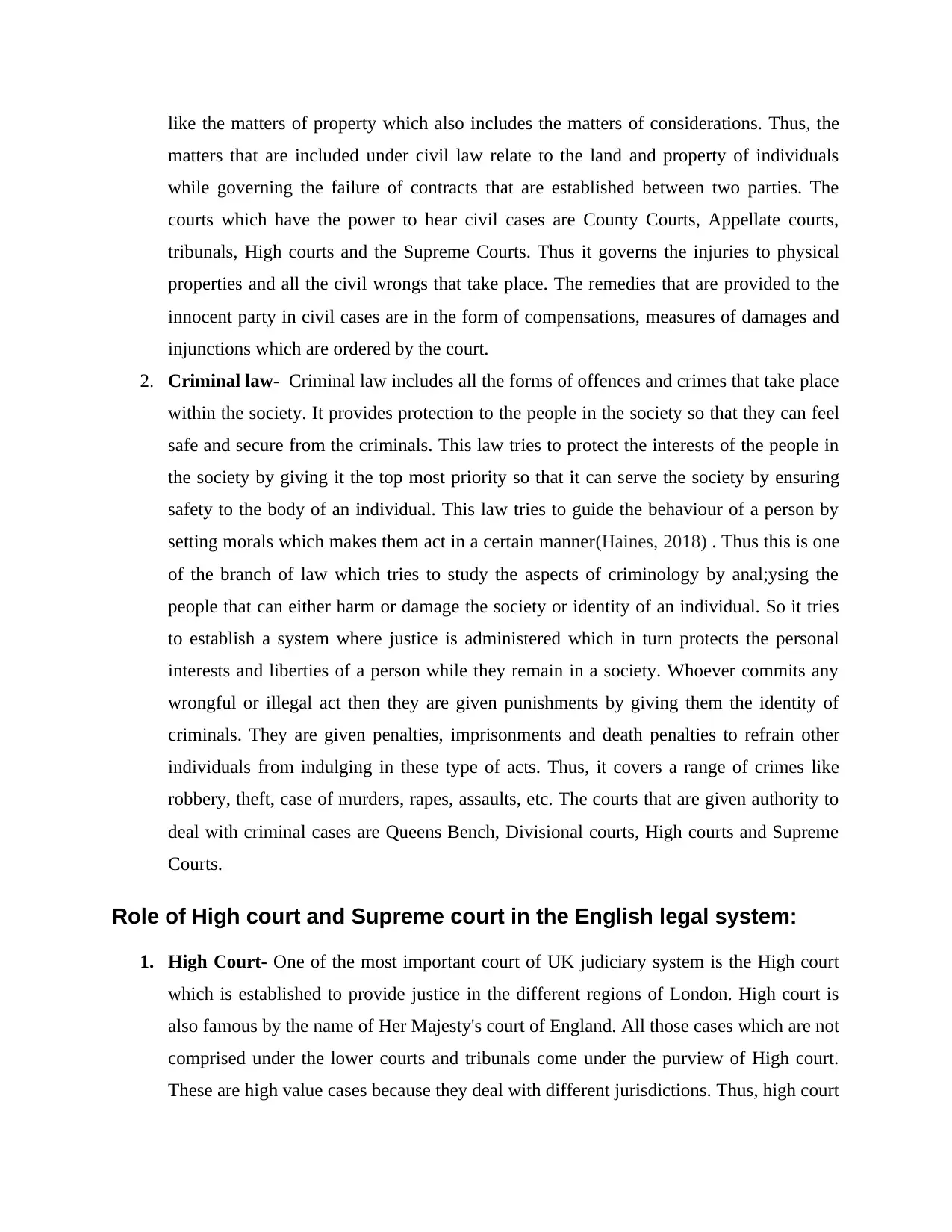
like the matters of property which also includes the matters of considerations. Thus, the
matters that are included under civil law relate to the land and property of individuals
while governing the failure of contracts that are established between two parties. The
courts which have the power to hear civil cases are County Courts, Appellate courts,
tribunals, High courts and the Supreme Courts. Thus it governs the injuries to physical
properties and all the civil wrongs that take place. The remedies that are provided to the
innocent party in civil cases are in the form of compensations, measures of damages and
injunctions which are ordered by the court.
2. Criminal law- Criminal law includes all the forms of offences and crimes that take place
within the society. It provides protection to the people in the society so that they can feel
safe and secure from the criminals. This law tries to protect the interests of the people in
the society by giving it the top most priority so that it can serve the society by ensuring
safety to the body of an individual. This law tries to guide the behaviour of a person by
setting morals which makes them act in a certain manner(Haines, 2018) . Thus this is one
of the branch of law which tries to study the aspects of criminology by anal;ysing the
people that can either harm or damage the society or identity of an individual. So it tries
to establish a system where justice is administered which in turn protects the personal
interests and liberties of a person while they remain in a society. Whoever commits any
wrongful or illegal act then they are given punishments by giving them the identity of
criminals. They are given penalties, imprisonments and death penalties to refrain other
individuals from indulging in these type of acts. Thus, it covers a range of crimes like
robbery, theft, case of murders, rapes, assaults, etc. The courts that are given authority to
deal with criminal cases are Queens Bench, Divisional courts, High courts and Supreme
Courts.
Role of High court and Supreme court in the English legal system:
1. High Court- One of the most important court of UK judiciary system is the High court
which is established to provide justice in the different regions of London. High court is
also famous by the name of Her Majesty's court of England. All those cases which are not
comprised under the lower courts and tribunals come under the purview of High court.
These are high value cases because they deal with different jurisdictions. Thus, high court
matters that are included under civil law relate to the land and property of individuals
while governing the failure of contracts that are established between two parties. The
courts which have the power to hear civil cases are County Courts, Appellate courts,
tribunals, High courts and the Supreme Courts. Thus it governs the injuries to physical
properties and all the civil wrongs that take place. The remedies that are provided to the
innocent party in civil cases are in the form of compensations, measures of damages and
injunctions which are ordered by the court.
2. Criminal law- Criminal law includes all the forms of offences and crimes that take place
within the society. It provides protection to the people in the society so that they can feel
safe and secure from the criminals. This law tries to protect the interests of the people in
the society by giving it the top most priority so that it can serve the society by ensuring
safety to the body of an individual. This law tries to guide the behaviour of a person by
setting morals which makes them act in a certain manner(Haines, 2018) . Thus this is one
of the branch of law which tries to study the aspects of criminology by anal;ysing the
people that can either harm or damage the society or identity of an individual. So it tries
to establish a system where justice is administered which in turn protects the personal
interests and liberties of a person while they remain in a society. Whoever commits any
wrongful or illegal act then they are given punishments by giving them the identity of
criminals. They are given penalties, imprisonments and death penalties to refrain other
individuals from indulging in these type of acts. Thus, it covers a range of crimes like
robbery, theft, case of murders, rapes, assaults, etc. The courts that are given authority to
deal with criminal cases are Queens Bench, Divisional courts, High courts and Supreme
Courts.
Role of High court and Supreme court in the English legal system:
1. High Court- One of the most important court of UK judiciary system is the High court
which is established to provide justice in the different regions of London. High court is
also famous by the name of Her Majesty's court of England. All those cases which are not
comprised under the lower courts and tribunals come under the purview of High court.
These are high value cases because they deal with different jurisdictions. Thus, high court
Paraphrase This Document
Need a fresh take? Get an instant paraphrase of this document with our AI Paraphraser
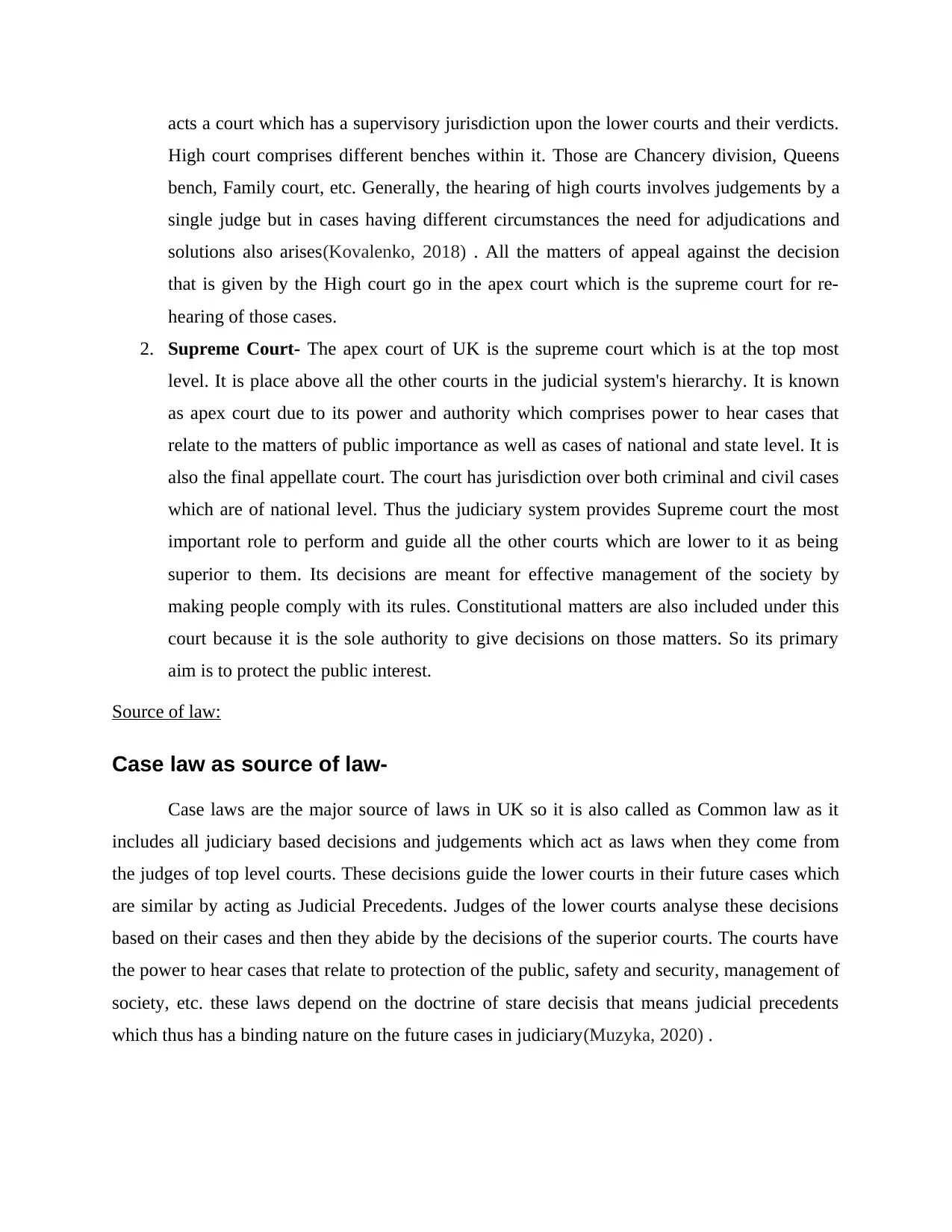
acts a court which has a supervisory jurisdiction upon the lower courts and their verdicts.
High court comprises different benches within it. Those are Chancery division, Queens
bench, Family court, etc. Generally, the hearing of high courts involves judgements by a
single judge but in cases having different circumstances the need for adjudications and
solutions also arises(Kovalenko, 2018) . All the matters of appeal against the decision
that is given by the High court go in the apex court which is the supreme court for re-
hearing of those cases.
2. Supreme Court- The apex court of UK is the supreme court which is at the top most
level. It is place above all the other courts in the judicial system's hierarchy. It is known
as apex court due to its power and authority which comprises power to hear cases that
relate to the matters of public importance as well as cases of national and state level. It is
also the final appellate court. The court has jurisdiction over both criminal and civil cases
which are of national level. Thus the judiciary system provides Supreme court the most
important role to perform and guide all the other courts which are lower to it as being
superior to them. Its decisions are meant for effective management of the society by
making people comply with its rules. Constitutional matters are also included under this
court because it is the sole authority to give decisions on those matters. So its primary
aim is to protect the public interest.
Source of law:
Case law as source of law-
Case laws are the major source of laws in UK so it is also called as Common law as it
includes all judiciary based decisions and judgements which act as laws when they come from
the judges of top level courts. These decisions guide the lower courts in their future cases which
are similar by acting as Judicial Precedents. Judges of the lower courts analyse these decisions
based on their cases and then they abide by the decisions of the superior courts. The courts have
the power to hear cases that relate to protection of the public, safety and security, management of
society, etc. these laws depend on the doctrine of stare decisis that means judicial precedents
which thus has a binding nature on the future cases in judiciary(Muzyka, 2020) .
High court comprises different benches within it. Those are Chancery division, Queens
bench, Family court, etc. Generally, the hearing of high courts involves judgements by a
single judge but in cases having different circumstances the need for adjudications and
solutions also arises(Kovalenko, 2018) . All the matters of appeal against the decision
that is given by the High court go in the apex court which is the supreme court for re-
hearing of those cases.
2. Supreme Court- The apex court of UK is the supreme court which is at the top most
level. It is place above all the other courts in the judicial system's hierarchy. It is known
as apex court due to its power and authority which comprises power to hear cases that
relate to the matters of public importance as well as cases of national and state level. It is
also the final appellate court. The court has jurisdiction over both criminal and civil cases
which are of national level. Thus the judiciary system provides Supreme court the most
important role to perform and guide all the other courts which are lower to it as being
superior to them. Its decisions are meant for effective management of the society by
making people comply with its rules. Constitutional matters are also included under this
court because it is the sole authority to give decisions on those matters. So its primary
aim is to protect the public interest.
Source of law:
Case law as source of law-
Case laws are the major source of laws in UK so it is also called as Common law as it
includes all judiciary based decisions and judgements which act as laws when they come from
the judges of top level courts. These decisions guide the lower courts in their future cases which
are similar by acting as Judicial Precedents. Judges of the lower courts analyse these decisions
based on their cases and then they abide by the decisions of the superior courts. The courts have
the power to hear cases that relate to protection of the public, safety and security, management of
society, etc. these laws depend on the doctrine of stare decisis that means judicial precedents
which thus has a binding nature on the future cases in judiciary(Muzyka, 2020) .
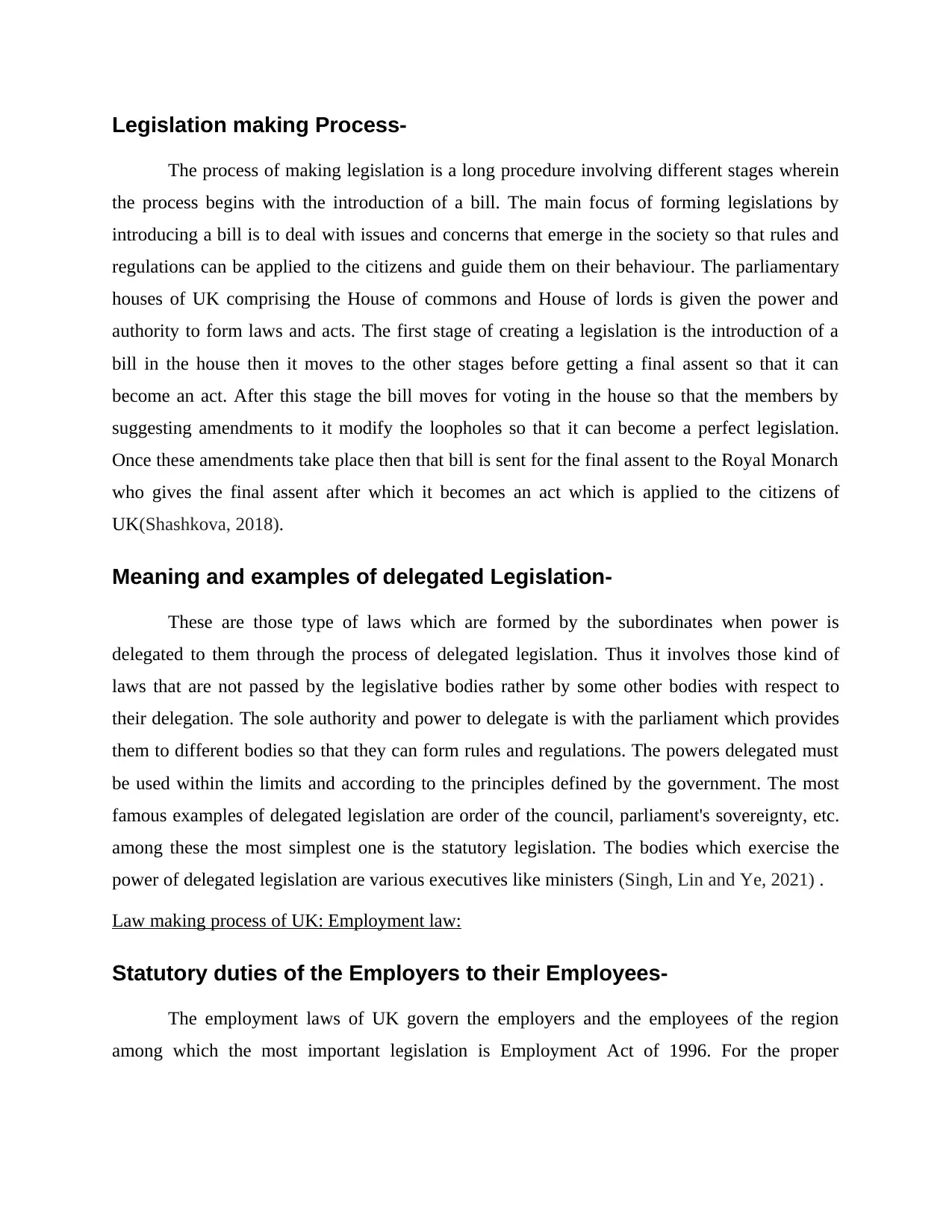
Legislation making Process-
The process of making legislation is a long procedure involving different stages wherein
the process begins with the introduction of a bill. The main focus of forming legislations by
introducing a bill is to deal with issues and concerns that emerge in the society so that rules and
regulations can be applied to the citizens and guide them on their behaviour. The parliamentary
houses of UK comprising the House of commons and House of lords is given the power and
authority to form laws and acts. The first stage of creating a legislation is the introduction of a
bill in the house then it moves to the other stages before getting a final assent so that it can
become an act. After this stage the bill moves for voting in the house so that the members by
suggesting amendments to it modify the loopholes so that it can become a perfect legislation.
Once these amendments take place then that bill is sent for the final assent to the Royal Monarch
who gives the final assent after which it becomes an act which is applied to the citizens of
UK(Shashkova, 2018).
Meaning and examples of delegated Legislation-
These are those type of laws which are formed by the subordinates when power is
delegated to them through the process of delegated legislation. Thus it involves those kind of
laws that are not passed by the legislative bodies rather by some other bodies with respect to
their delegation. The sole authority and power to delegate is with the parliament which provides
them to different bodies so that they can form rules and regulations. The powers delegated must
be used within the limits and according to the principles defined by the government. The most
famous examples of delegated legislation are order of the council, parliament's sovereignty, etc.
among these the most simplest one is the statutory legislation. The bodies which exercise the
power of delegated legislation are various executives like ministers (Singh, Lin and Ye, 2021) .
Law making process of UK: Employment law:
Statutory duties of the Employers to their Employees-
The employment laws of UK govern the employers and the employees of the region
among which the most important legislation is Employment Act of 1996. For the proper
The process of making legislation is a long procedure involving different stages wherein
the process begins with the introduction of a bill. The main focus of forming legislations by
introducing a bill is to deal with issues and concerns that emerge in the society so that rules and
regulations can be applied to the citizens and guide them on their behaviour. The parliamentary
houses of UK comprising the House of commons and House of lords is given the power and
authority to form laws and acts. The first stage of creating a legislation is the introduction of a
bill in the house then it moves to the other stages before getting a final assent so that it can
become an act. After this stage the bill moves for voting in the house so that the members by
suggesting amendments to it modify the loopholes so that it can become a perfect legislation.
Once these amendments take place then that bill is sent for the final assent to the Royal Monarch
who gives the final assent after which it becomes an act which is applied to the citizens of
UK(Shashkova, 2018).
Meaning and examples of delegated Legislation-
These are those type of laws which are formed by the subordinates when power is
delegated to them through the process of delegated legislation. Thus it involves those kind of
laws that are not passed by the legislative bodies rather by some other bodies with respect to
their delegation. The sole authority and power to delegate is with the parliament which provides
them to different bodies so that they can form rules and regulations. The powers delegated must
be used within the limits and according to the principles defined by the government. The most
famous examples of delegated legislation are order of the council, parliament's sovereignty, etc.
among these the most simplest one is the statutory legislation. The bodies which exercise the
power of delegated legislation are various executives like ministers (Singh, Lin and Ye, 2021) .
Law making process of UK: Employment law:
Statutory duties of the Employers to their Employees-
The employment laws of UK govern the employers and the employees of the region
among which the most important legislation is Employment Act of 1996. For the proper
⊘ This is a preview!⊘
Do you want full access?
Subscribe today to unlock all pages.

Trusted by 1+ million students worldwide
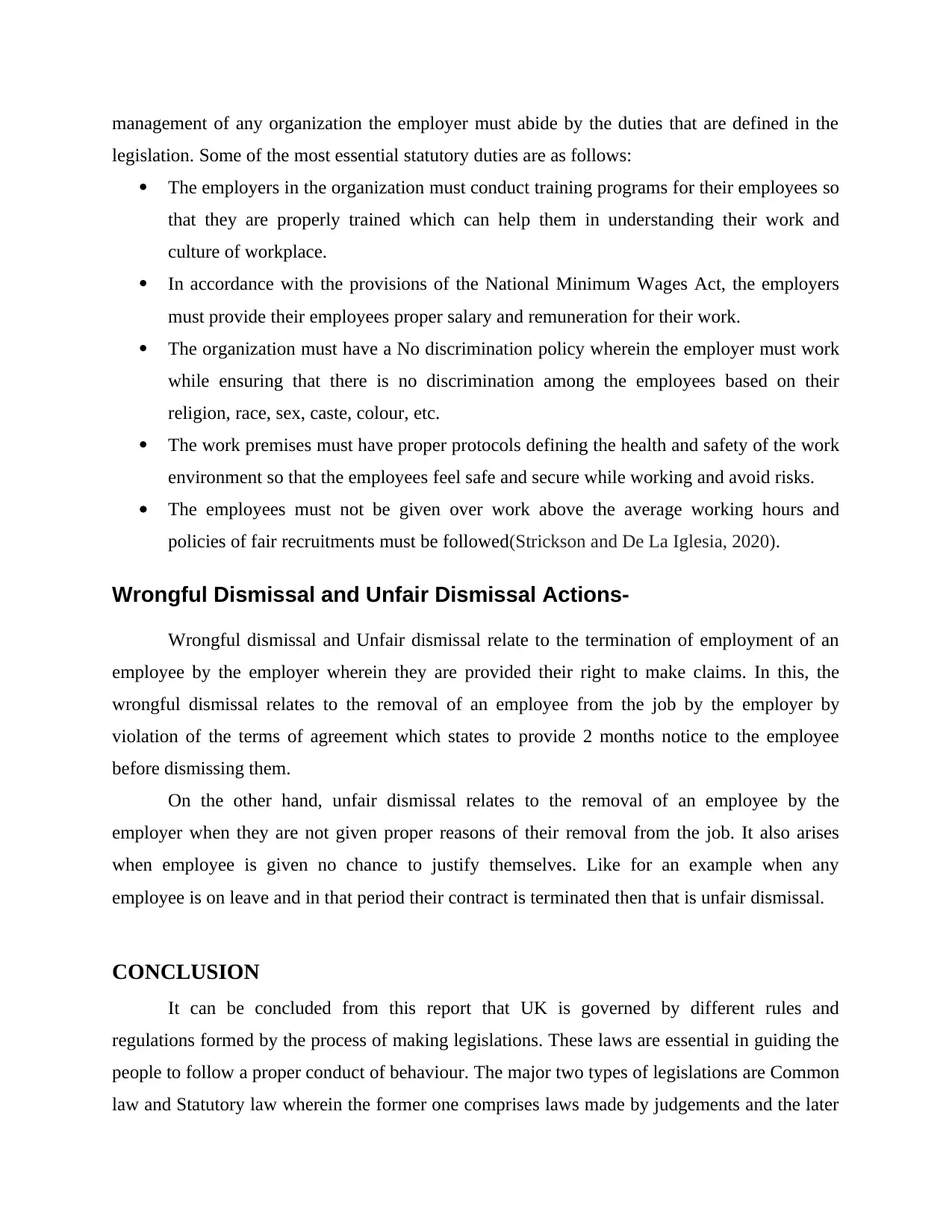
management of any organization the employer must abide by the duties that are defined in the
legislation. Some of the most essential statutory duties are as follows:
The employers in the organization must conduct training programs for their employees so
that they are properly trained which can help them in understanding their work and
culture of workplace.
In accordance with the provisions of the National Minimum Wages Act, the employers
must provide their employees proper salary and remuneration for their work.
The organization must have a No discrimination policy wherein the employer must work
while ensuring that there is no discrimination among the employees based on their
religion, race, sex, caste, colour, etc.
The work premises must have proper protocols defining the health and safety of the work
environment so that the employees feel safe and secure while working and avoid risks.
The employees must not be given over work above the average working hours and
policies of fair recruitments must be followed(Strickson and De La Iglesia, 2020).
Wrongful Dismissal and Unfair Dismissal Actions-
Wrongful dismissal and Unfair dismissal relate to the termination of employment of an
employee by the employer wherein they are provided their right to make claims. In this, the
wrongful dismissal relates to the removal of an employee from the job by the employer by
violation of the terms of agreement which states to provide 2 months notice to the employee
before dismissing them.
On the other hand, unfair dismissal relates to the removal of an employee by the
employer when they are not given proper reasons of their removal from the job. It also arises
when employee is given no chance to justify themselves. Like for an example when any
employee is on leave and in that period their contract is terminated then that is unfair dismissal.
CONCLUSION
It can be concluded from this report that UK is governed by different rules and
regulations formed by the process of making legislations. These laws are essential in guiding the
people to follow a proper conduct of behaviour. The major two types of legislations are Common
law and Statutory law wherein the former one comprises laws made by judgements and the later
legislation. Some of the most essential statutory duties are as follows:
The employers in the organization must conduct training programs for their employees so
that they are properly trained which can help them in understanding their work and
culture of workplace.
In accordance with the provisions of the National Minimum Wages Act, the employers
must provide their employees proper salary and remuneration for their work.
The organization must have a No discrimination policy wherein the employer must work
while ensuring that there is no discrimination among the employees based on their
religion, race, sex, caste, colour, etc.
The work premises must have proper protocols defining the health and safety of the work
environment so that the employees feel safe and secure while working and avoid risks.
The employees must not be given over work above the average working hours and
policies of fair recruitments must be followed(Strickson and De La Iglesia, 2020).
Wrongful Dismissal and Unfair Dismissal Actions-
Wrongful dismissal and Unfair dismissal relate to the termination of employment of an
employee by the employer wherein they are provided their right to make claims. In this, the
wrongful dismissal relates to the removal of an employee from the job by the employer by
violation of the terms of agreement which states to provide 2 months notice to the employee
before dismissing them.
On the other hand, unfair dismissal relates to the removal of an employee by the
employer when they are not given proper reasons of their removal from the job. It also arises
when employee is given no chance to justify themselves. Like for an example when any
employee is on leave and in that period their contract is terminated then that is unfair dismissal.
CONCLUSION
It can be concluded from this report that UK is governed by different rules and
regulations formed by the process of making legislations. These laws are essential in guiding the
people to follow a proper conduct of behaviour. The major two types of legislations are Common
law and Statutory law wherein the former one comprises laws made by judgements and the later
Paraphrase This Document
Need a fresh take? Get an instant paraphrase of this document with our AI Paraphraser

one are the laws made by legislature. In the judiciary system, Supreme court is at the top level
and below it is the High court. There are two types of cases handled by these courts which are
criminal cases and civil cases. For defining the duties of the employers various employment
legislations are made which also lay down what is wrongful dismissal and unfair dismissal.
and below it is the High court. There are two types of cases handled by these courts which are
criminal cases and civil cases. For defining the duties of the employers various employment
legislations are made which also lay down what is wrongful dismissal and unfair dismissal.
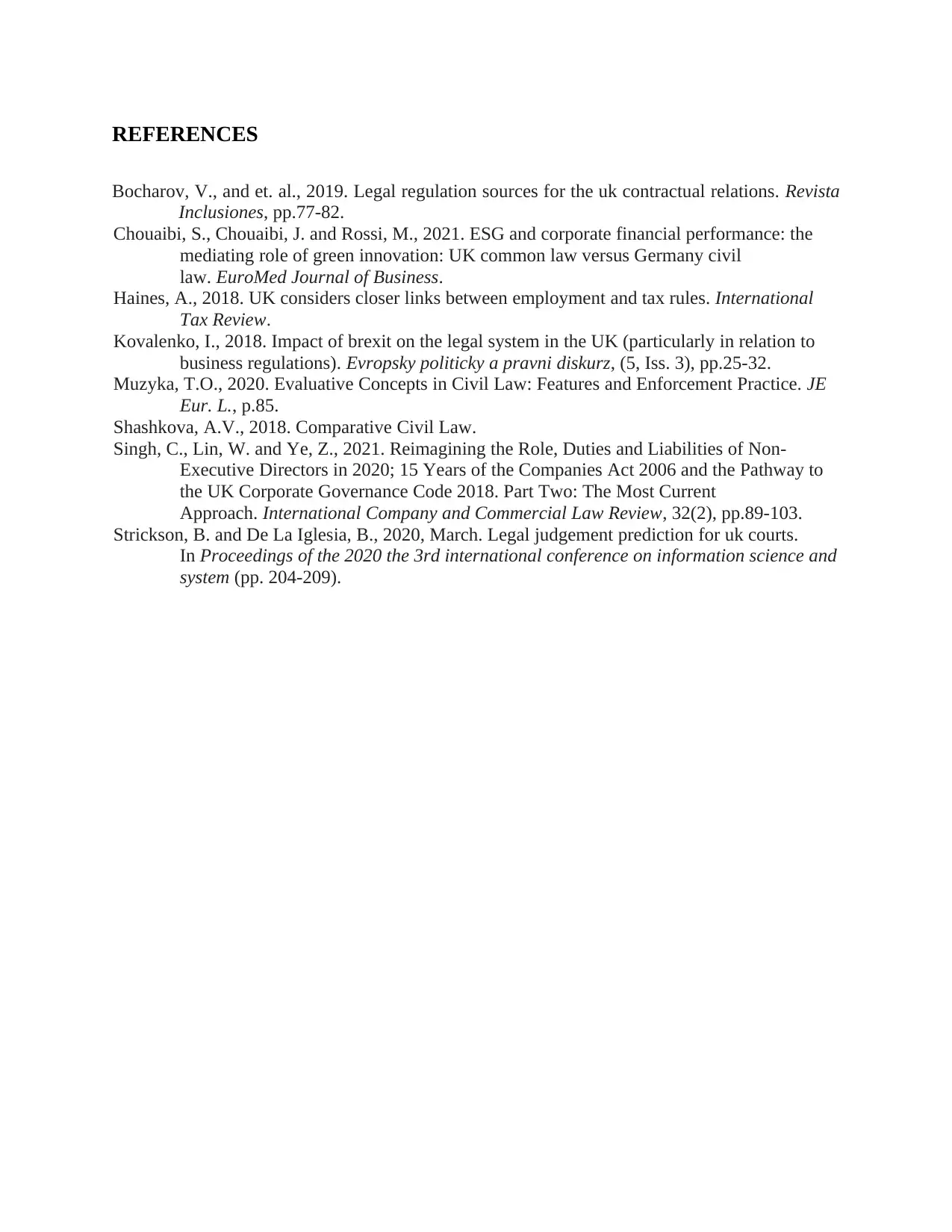
REFERENCES
Bocharov, V., and et. al., 2019. Legal regulation sources for the uk contractual relations. Revista
Inclusiones, pp.77-82.
Chouaibi, S., Chouaibi, J. and Rossi, M., 2021. ESG and corporate financial performance: the
mediating role of green innovation: UK common law versus Germany civil
law. EuroMed Journal of Business.
Haines, A., 2018. UK considers closer links between employment and tax rules. International
Tax Review.
Kovalenko, I., 2018. Impact of brexit on the legal system in the UK (particularly in relation to
business regulations). Evropsky politicky a pravni diskurz, (5, Iss. 3), pp.25-32.
Muzyka, T.O., 2020. Evaluative Concepts in Civil Law: Features and Enforcement Practice. JE
Eur. L., p.85.
Shashkova, A.V., 2018. Comparative Civil Law.
Singh, C., Lin, W. and Ye, Z., 2021. Reimagining the Role, Duties and Liabilities of Non-
Executive Directors in 2020; 15 Years of the Companies Act 2006 and the Pathway to
the UK Corporate Governance Code 2018. Part Two: The Most Current
Approach. International Company and Commercial Law Review, 32(2), pp.89-103.
Strickson, B. and De La Iglesia, B., 2020, March. Legal judgement prediction for uk courts.
In Proceedings of the 2020 the 3rd international conference on information science and
system (pp. 204-209).
Bocharov, V., and et. al., 2019. Legal regulation sources for the uk contractual relations. Revista
Inclusiones, pp.77-82.
Chouaibi, S., Chouaibi, J. and Rossi, M., 2021. ESG and corporate financial performance: the
mediating role of green innovation: UK common law versus Germany civil
law. EuroMed Journal of Business.
Haines, A., 2018. UK considers closer links between employment and tax rules. International
Tax Review.
Kovalenko, I., 2018. Impact of brexit on the legal system in the UK (particularly in relation to
business regulations). Evropsky politicky a pravni diskurz, (5, Iss. 3), pp.25-32.
Muzyka, T.O., 2020. Evaluative Concepts in Civil Law: Features and Enforcement Practice. JE
Eur. L., p.85.
Shashkova, A.V., 2018. Comparative Civil Law.
Singh, C., Lin, W. and Ye, Z., 2021. Reimagining the Role, Duties and Liabilities of Non-
Executive Directors in 2020; 15 Years of the Companies Act 2006 and the Pathway to
the UK Corporate Governance Code 2018. Part Two: The Most Current
Approach. International Company and Commercial Law Review, 32(2), pp.89-103.
Strickson, B. and De La Iglesia, B., 2020, March. Legal judgement prediction for uk courts.
In Proceedings of the 2020 the 3rd international conference on information science and
system (pp. 204-209).
⊘ This is a preview!⊘
Do you want full access?
Subscribe today to unlock all pages.

Trusted by 1+ million students worldwide
1 out of 9
Related Documents
Your All-in-One AI-Powered Toolkit for Academic Success.
+13062052269
info@desklib.com
Available 24*7 on WhatsApp / Email
![[object Object]](/_next/static/media/star-bottom.7253800d.svg)
Unlock your academic potential
Copyright © 2020–2026 A2Z Services. All Rights Reserved. Developed and managed by ZUCOL.